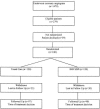Randomized, controlled trial of an interactive videodisc decision aid for patients with ischemic heart disease
- PMID: 11089711
- PMCID: PMC1495608
- DOI: 10.1046/j.1525-1497.2000.91139.x
Randomized, controlled trial of an interactive videodisc decision aid for patients with ischemic heart disease
Abstract
Objective: To determine the effect of the Ischemic Heart Disease Shared Decision-Making Program (IHD SDP) an interactive videodisc designed to assist patients in the decision-making process involving treatment choices for ischemic heart disease, on patient decision-making.
Design: Randomized, controlled trial.
Setting: The Toronto Hospital, University of Toronto, Toronto, Ontario, Canada.
Participants: Two hundred forty ambulatory patients with
Measurements and main results: The primary outcome was patient satisfaction with the decision-making process. This was measured using the 12-item Decision-Making Process Questionnaire that was developed and validated in a randomized trial of the benign prostatic hyperplasia SDP. Secondary outcomes included patient knowledge (measured using 20 questions about knowledge deemed necessary for an informed treatment decision), treatment decision, patient-angiographer agreement on decision, and general health scores. Outcomes were measured at the time of treatment decision and/or at 6 months follow-up. Shared decision-making program scores were similar for the intervention and control group (71% and 70%, respectively; 95% confidence interval [CI] for 1% difference, -3% to 7%). The intervention group had higher knowledge scores (75% vs 62%; 95% CI for 13% difference, 8% to 18%). The intervention group chose to pursue revascularization less often (58% vs 75% for the controls; 95% CI for 17% difference, 4% to 31%). At 6 months, 52% of the intervention group and 66% of the controls had undergone revascularization (95% CI for 14% difference, 0% to 28%). General health and angina scores were not different between the groups at 6 months. Exposure to the IHD SDP resulted in more patient-angiographer disagreement about treatment decisions.
Conclusions: There was no significant difference in satisfaction with decision-making process scores between the IHD SDP and usual practice groups. The IHD SDP patients were more knowledgeable, underwent less revascularization (interventional therapies), and demonstrated increased patient decision-making autonomy without apparent impact on quality of life.
Comment in
-
Tell it like it is: patients as partners in medical decision making.J Gen Intern Med. 2000 Oct;15(10):752-4. doi: 10.1046/j.1525-1497.2000.00815.x. J Gen Intern Med. 2000. PMID: 11089720 Free PMC article. No abstract available.
References
-
- Murray CJL, Lopez AD. Mortality by cause for eight regions of the world: global burden of disease study. Lancet. 1997;349:1269–76. - PubMed
-
- Peters S, Chagani K, Paddon P, Nair C. Coronary artery bypass surgery in Canada. Health Reports. 1990;2:9–26. - PubMed
-
- Peterson ED, Jollis JG, Bebchuk JD, et al. Changes in mortality after myocardial revascularization in the elderly: the national Medicare experience. Ann Intern Med. 1994;121:919–27. - PubMed
-
- Yusuf S, Zucker D, Peduzzi P, et al. Effect of coronary artery bypass graft surgery on survival: overview of 10-year results from randomised trials by the Coronary Artery Bypass Graft Surgery Trialists Collaboration [published erratum appears in Lancet 1994; 344:1446]. Lancet. 1994;344:563–70. Comments. - PubMed
Publication types
MeSH terms
LinkOut - more resources
Full Text Sources

